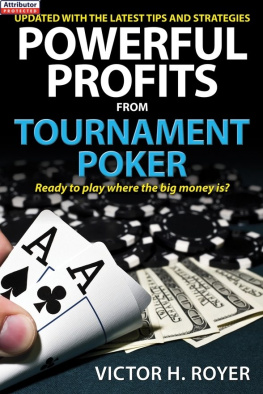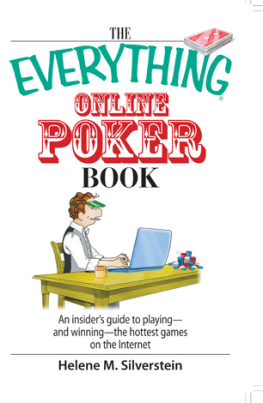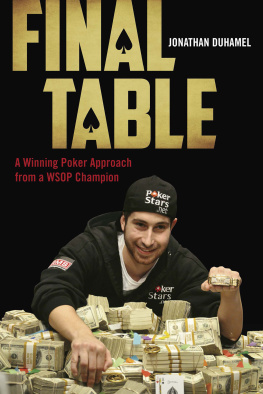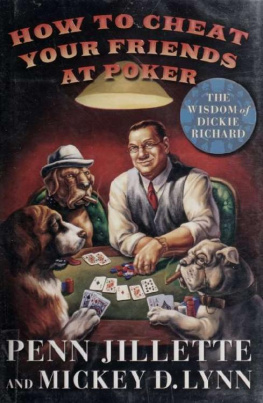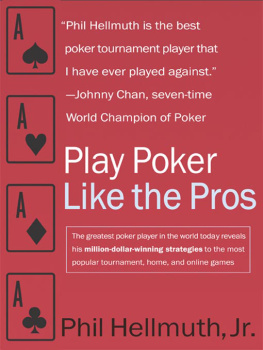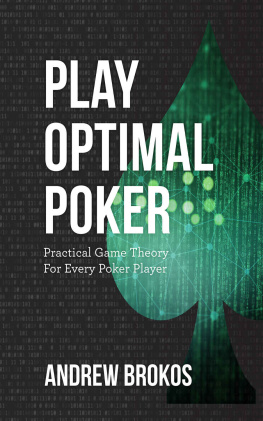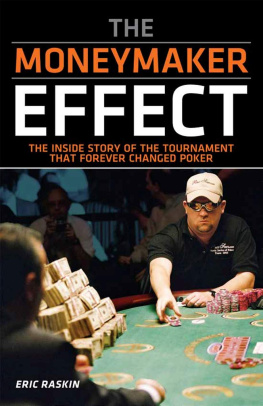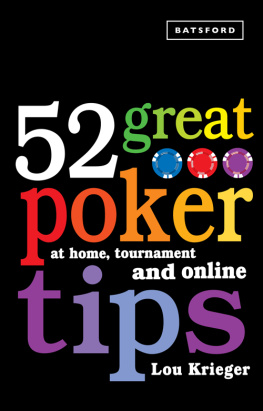Sometimes nothing can be a real cool hand.
I dont usually eat a big breakfast. Nine oclock in the morning, most mornings, my stomachs not really awake yet, but this wasnt like most mornings. This was Monday morning, May 19, the first day of the 2003 World Series of Poker, and I was about to join 838 of the best poker players on the planet, on the floor of one of the most famous poker halls in the country, in a last-man-standing, knockout tournament to crown a worlds champion.
I was here on a whim and a prayer and the fool notion that I stood even the slightest chance. Id won a $40 promotional tournament staged by an online poker site called Poker Stars, and the first prize was a $10,000 World Series seat. I didnt win any money, mind you, just an all-expenses-paid trip to Vegas and the chance to sit across the table from these great players and get my ass kicked. Some prize.
The main event started at noon, and I couldnt see playing on an empty stomach. Id be at it all day, with any luck, and Id probably be too antsy to eat during the scheduled dinner break, so I ordered up a great, heaping plate of bacon and eggs and home fries. A glass of orange juice to wash it down. I waited on the food and tried to calm my nerves. The small restaurant was pretty much empty. A couple other guyspoker players, I was guessingkeeping mostly to themselves, getting their heads together for the first day. No one I recognized.
Not much in the way of a breakfast crowd around here. Not much of any kind of crowd, really, save for the players and poker groupies and friends and family. Binions Horseshoe Hotel and Casino, for all its history and character, didnt really attract a typical Vegas clientele. The place was threadbare and throwback, more Holiday Inn than Mandalay Bay, more roughneck than highbrow. There was probably more denim and turquoise in this one casino than there was in the whole of Vegasby the kind of wide margin some of these people would want to bet on. Folks came to Binions to gamble, just, and they didnt much go for the pomp and glitz and sideshows the way they did at some of the shinier hotels and casinos. They didnt strut. They went about their business, and, for a lot of these people, gambling was their business. At Binionsin the older part of the city, well off the Stripthe carpets were frayed, there were lightbulbs missing in the marquee, and the waitresses all looked a little older and a little more beaten down than they did at every other joint in town, but nobody cared. At Binions the cards were all that mattered.
I was nervous as hell, and the time to kill wasnt helping. Id never played in a live poker tournament in my life, and in just a couple hours, Id be going up against the reigning legends of the game: Johnny Chan, Scotty Nguyen, T. J. Cloutier, Phil Hellmuth, Amarillo Slim. Their names alone scared the plain shit out of me, and as my mind raced over the list of entrants Id seen registered for the tournament, I realized I wouldnt know half these guys if I tripped over them. Id read about them. Id heard about them. I knew Johnny Chan from Rounders , the all-time-greatest poker movie, with Matt Damon and Edward Norton and John Malkovich. I knew that T. J. Cloutier was supposedly the best player never to win the main event at the World Series. But Id never seen them playnot all of them, not in any kind of studied way.
I looked around and tried to determine if any of these few other diners were checking me out, wondering who I was, whether I belonged. And I was wondering pretty much the same. Wondering, too, why I hadnt tanked the last couple hands in that Poker Stars tournament and copped the $8,000 runner-up prize, money I could have used with a new house and a new baby and enough credit-card debt to keep me up nights. Wondering if my Oakley Straightjacket shades made me look intimidating, or if the Poker Stars threads the company was making me wear marked me as easy pickings. Wondering how I might bluff my way through the first day of the tournament. That was my goal, going in, to make it through the first day. Wasnt much of a goal, but I was trying to be realistic.
I took my time with the bacon and eggs. Nursed that orange juice like I was on death row and this was my last meal. Knowing that, soon as I finished, Id have to make my way downstairs to the poker tables and get myself killed. It was early, and most of the players in the tournament were probably still in bed, but I couldnt sleep. Tossed and turned and played out all kinds of imagined hands in my head. There was too much going on, too much to worry about, too much at stake. It was all just too, too damn much.
Slowly the restaurant began to fill, and by ten oclock I needed to get out of there. I wanted to be off by myself somewhere, to stretch out some, get my head around what was about to happen, consider what passed for my strategy: to hold on, keep my cool, take some time with my cards. I told myself Id wait a full five seconds before calling or checking or betting. Usually I make my moves as they occur to me, but Id have to change my game plan to compete at this level, mix things up a little. Whatever the situation, it wouldnt do to be jumping into these pots on an impulse, without really thinking about it, not against the best of the best. Doesnt seem like much, five seconds, but its all the time in the world when youve got a real hand. That was about all I had, in terms of strategy. That and the Oakley Straightjackets I was hoping to hide behind, not wanting to give away a thing.
I made my way down to the table where Id be playing. There were ninety or so tables set up for the first day of play, most of them in a big room about the size of a football field. To look out on that room, with all those damn tables, was to grasp the magnitude of this event, begun thirty-four years earlier on a kind of lark and now one of the most popular world-class competitions in any sportif you can even consider poker a sport. (Some folks do, Im told, on the theory that if you break a sweat, it must be a physical activity.) Part of the appeal of the World Series was that it was open to anyone with $10,000 and the balls to go for it. Anyone can winthats the tournament slogan used by the folks at Binions, and its a tremendous hook. Imagine being able to buy your way into the Indy 500 or the U.S. Open. To head into the same turns, the same dog-legs left, against all those awesome champions. Its one of the great thrills good money can buy, and these days there are all kinds of satellite tournaments and tie-in promotions that make it possible for amateurs like me to sit down at Binions main event with a buy-in of just $40.
So yeah, anyone can win. In theory.
I was assigned to Table 8, which was in a smaller room of tables, downstairs from the main floor. Still a big room, but nothing like the football field overhead. There was no one around. It felt a little bit like I was at a wedding reception, and Id wandered over to my table ahead of everyone else, and there was nothing to do but stand there awkwardly, waiting for someone to come join me. I set my Oakleys down on the table in front of my assigned seatseat fourthinking my opponents would be by soon enough and see that Id already been here, thinking maybe it would give me some kind of edge.


